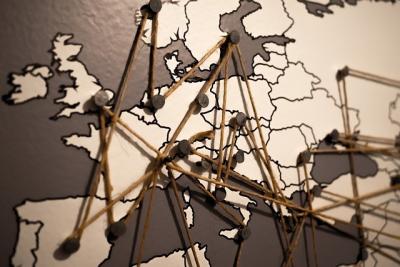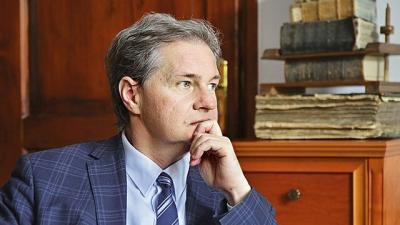Does the European Union Contribute to Moral Growth? How to Find the Place Where We Can Stop?
What is the “moral growth” indicated in the title? When seeking an answer to this question, one certainly should reflect on a related term – “moral progress”. A long time ago Gilbert Chesterton observed that people regard as progress everything that they currently follow, and in this particular field they will certainly take note of every step forward[1]. However, the English writer stressed that equating “progress” with the current (intellectual or ideological) fad fails to adequately address the meaning of the word. As the author of Orthodoxy wrote, progress, in the good sense, does not consist in looking for a direction in which one can go on indefinitely. It would be far truer to say that true progress consists in looking for the place where we can stop[2].
What we need, then, is a point of reference, a goal, or an ideal towards which we are aiming, and a model for our development. Otherwise, we would not be talking about progress or development, but about going adrift. To avoid this, we need a compass which points the direction to the place where we can stop.
As it is wrong to equate progress with transient fads, it is just as wrong to equate progress with novelty. In the colloquial sense, a reference to someone or something as “progressive” implies that someone or something is open to novelties (innovations). In this view, “moral progress” would be the pursuit of a “novel” view (on the part of individuals and societies) of the moral principles which for centuries have been regarded by Europeans as inviolable, as the place where we can stop.
The European Union seen as a set of EU institutions (as described in the Treaties establishing and modifying the functioning of the EU) and the people who head or sit on these institutions, is certainly a major contributor to “moral progress” in the latter sense. Suffice it to mention the “innovative” approach adopted by the European Parliament dominated by various left-wing and liberal groups to the notion of “human rights,” the core of social and individual morality. In the current interpretation of the EP, the “human rights” now include the “reproductive rights” of women, implying an option for and in some situations even an obligation to perform “abortions,” that is, the killing of an innocent and completely defenseless human being.
Of a similar nature is the promotion by various EU institutions (the EP, the European Commission, etc.) of the “rights of LGBT people,” accompanied by the promotion of the principle of “non-discrimination on grounds of sexual orientation”. Closely correlated with this is the so-called “equality legislation” in force in the vast majority of EU countries and the legally defined fight against “hate speech”. This is accompanied by a kind of “morally progressive” vocabulary that justifies these measures as aid for the “excluded” and “discriminated”.
Equally noteworthy is the fact that there is no place where we can stop in sight. No end is near of a new (innovative) view of the family and human nature, notions which are vital for the morality of individuals and whole communities. Not only do the major EU institutions not oppose, but they actually promote legislation that subverts the notion of the “family,” present in Europe for centuries (cf. the expansion in recent years of the legalization of “same-sex marriages”).
Let us regard the eponymous question through the prism of understanding “moral progress” as a striving to find (return to) a sustainable point of reference, a place where we can stop. In this context, what matters is not what is new, or innovative, but what is true and thus sustainable. This naturally directs our gaze to the beginning. In this case, it is the beginning of what we call Europe, or more precisely: a true Europe, understood as a specific cultural community.
Addressing the German Bundestag in 2011, Pope Benedict XVI recalled that this Europe “arose from the encounter between Jerusalem, Athens, and Rome – from the encounter between Israel's monotheism and the philosophical reason of the Greeks and Roman law.” Those words resounded only a few years after the conclusion of work on the “European constitution” (ultimately rejected in referenda by voters in the Netherlands and France). The constitution was drafted by the “European Convention” headed by the former “central-right” President of France, Valery Giscard d'Estaigne. Successive versions of the preamble to the document carefully omitted “Jerusalem” (that is Christian inspirations) during the drafting of the cultural roots of European identity. While the Constitution for Europe project ultimately failed, the erasure of references to Christianity from the introduction to the planned Basic Law of the European Union aptly reflected the state of spirit and mind of most political and clerical elites heading or sitting on EU institutions. It definitely did not correspond (nor does it now correspond) to the understanding of “moral growth” as a capacity to find the place where we can stop as it is a successful return to the roots of European identity, including the vision of a moral life of an individual and entire societies.
A close observer of the social and political reality in the EU countries over the last decade or so may say that efforts for the sake of moral growth in the sense of seeking/returning to the place where we can stop are taking place not thanks to, but in spite of the EU. In this context, I would like to draw attention to the social movement for the defense of the family based on a permanent union between a man and a woman, called La Manif Pour Tous. It emerged in France during 2013-2014 in the form of mass demonstrations opposing the legalization of “same-sex marriages” in that country.
I can offer another example from Poland. In 2021, the Constitutional Tribunal upheld an earlier ratio decidendi (dating back to 1997) for the sake of strengthening the safeguard for the protection of life, present in the Polish Charter of Fundamental Rights since 1997. In 2021, the Constitutional Tribunal found unconstitutional the eugenic grounds for “abortion” (namely a suspicion of an incurable illness or developmental defects). The ruling triggered a spate of violent, Christophobic demonstrations across Poland. In many locations, they were paired with assaults on the clergy and religious men and women as well as with disruptions of religious services in churches. During those demonstrations, some church buildings were damaged by those who call themselves “supporters of women's reproductive rights”.
No EU institution backed the right of the freedom of professing one's faith, evidently violated by the aforementioned demonstrations of advocates of unlimited killing of unborn human beings. In fact, the reverse was true. A ruling of the Constitutional Tribunal, which should be considered as one of the most significant examples of “moral growth” in EU members states in recent years (for nothing contributes more to the moral conduct of individuals and whole social groups as “integral solidarity” with the most vulnerable)[3], was a pretext for another debate against Poland in the European Parliament. That time, the group of EP decisionmakers (as we all know, implicated in sleaze) voiced support of “women's reproductive rights” allegedly violated in Poland.
The European Parliament adopted a similarly negative approach to La Manif Pour Tous, the French social movement unrelated to any religion. Millions of French citizens who demanded the creation of conditions in their country for true “moral growth” (that is, affirmation of the family based on a permanent union of man and woman) failed to receive any support from the most important EU bodies.
On the other hand, there are dozens of examples of discrimination against Christians who are serious believers (that is, those who try to demonstrate their faith in the public sphere) in various EU countries. Under the pretext of “equality law” and the fight against “hate speech,” such Christians are denied the right to live by their faith, for example, when it comes to the operation of adoption agencies or provision of cake-making services[4]. Limiting the fundamental human right to the freedom of religion and the EU's inertia in this respect can hardly be called action for the sake of “moral growth”.
Regrettably, Pope Benedict XVI's 2010 diagnosis is as topical as ever:
There are those who would advocate that the voice of religion be silenced, or at least relegated to the purely private sphere. There are those who argue that the public celebration of festivals such as Christmas should be discouraged, in the questionable belief that it might somehow offend those of other religions or none. And there are those who argue – paradoxically with the intention of eliminating discrimination – that Christians in public roles should be required to sometimes act against their conscience. These are worrying signs of a failure to appreciate not only the rights of believers to freedom of conscience and freedom of religion, but also the legitimate role of religion in the public sphere[5].
Such a social and cultural reality is hardly conducive to “moral growth” (or the “growth of morality”) in the sense of standing by the principles that have for centuries shaped the growth consolidation of European cultural identity and the moral principles abided by millions of Europeans. Moral growth seen in this way is threatened not only by the revolutionary ideology of neo-Marxist provenance embraced by “the 1968 generation” and its “grandchildren”, who over the last four decades have successfully entered and settled in multiple cultural, media, academic, and political institutions of the Western world, with EU institutions being no exception in this respect.
An equally grave threat is posed by the proposed “remedies”, which are actually worse than the “disease”. This is how we should view Hegelianism, or neo-Hegelianism – namely as a product of German idealist philosophy, an “attack on Catholic thinking”, just as hazardous as obscure esotericism, such as New Age[6]. Some, including conservative circles, regard this dangerous philosophical proposition as a remedy to the threat posed by the multiple varieties of neomarxist ideologies. The fact that German Idealism is considered a possible intellectual remedy to these threats or even a basis for “moral growth” in the EU should be a matter of concern, especially in Poland.
None other but Immanuel Kant wrote in 1795, shortly after the third partition of Poland, that the dismantling of the Polish state by the partitioners had to be welcomed as inherently beneficial for the general progress of civilization, since subjected to the rule of the “Prussian education state [Erziehungsstaat]”, Poles would get an unrepeatable chance to “unlearn their barbaric freedom.”[7] In turn, when justifying Poland's partitions, Georg Wilhelm Hegel stressed that the Polish nation was a “nation without history,” or rather a “nation outside history” and as such it was one of the “nations doomed to fail”[8]. It is difficult to label views which legitimize acts of violent aggression and violations of international law (such as the partition of Poland) as enhancing the conditions for moral development anywhere.
The latter can only be found through a return to the principles of natural law. Pope Pius XI wrote about this in 1937 in his magnificent anti-totalitarian encyclicals, pointing out that on the basis of natural law, people of many faiths can come together to find a common denominator for their opposition to totalitarian reality. Saint John Paul II wrote in his 1991 “Centesimus annus” encyclical about “open or thinly disguised totalitarianism” into which a “democracy without values” degenerates. Two years later, he supplemented the diagnosis with a grand affirmation of natural law in “Veritatis splendor”.
The teaching of the Polish Pope's immediate successor was phrased in the same spirit. In 2008, at the United Nations, Benedict XVI stressed that “[h]uman rights, then, must be respected as an expression of justice, and not merely because they are enforceable through the will of the legislators”, as well as that “[t]he full guarantee of religious liberty cannot be limited to the free exercise of worship, but has to give due consideration to the public dimension of religion, and hence to the possibility of believers playing their part in building the social order.”
A vision formulated in this way of seeking the place where we can stop is, in my view, the most suitable prescription for moral development in the countries of the European Union. It guarantees the equitable participation of all Europeans, regardless of their faith and beliefs, in the reconstruction of the cultural identity of the Old Continent.
[1] G. K. Chesterton, Obrona wiary. Wybór publicystyki (1920‒ 1930), translated by J. Rydzewska (Warsaw: 2012), p. 9.
[2] Ibid., p. 132.
[3] During his 1991 pastoral trip to Poland, St. John Paul II referred to “integral solidarity” in the context of strengthening the legal safeguards for the life of unborn human beings.
[4] I am referring here to examples of discrimination of the Christians who oppose adoption of children by homosexual couples or refuse to make cakes for “weddings” of such couples.
[5] Address at the Westminster Hall, 17 September 2010.
[6] M. Gogacz, Okruszyny (Niepokalanów: 1993), p. 62. In the words of this eminent Polish scholar, Hegelianism is monism, that is, a view that all reality is something structurally unified. In Hegelianism, to encourage unity is to induce identification with God, people, and the world. This identification is discursively given to us in a falsified theory of the spirit, which evolutionarily transforms itself from the primal thought into man and then into society. In contrast, realism consists in apprehending structural elements not created by our thought. Concepts and cognition do not make up entities. The recognition of all this constitutes a realist philosophy, and through this philosophy it is an understanding of the truths of faith consistent with the contents of these truths. Thus, a realistic philosophy of being protects the truths that are Catholicism. Ibid., pp. 63, 66.
[7] H. J. Seepel, Das Polenbild der Deutschen. Vom Anfang des 19. Jahrhunderts bis zum Ende der Revolution von 1848 (Kiel: 1967), p. 131.
[8] B. E. Vick, Defining Germany. The 1848 Frankfurt Parliamentarians and National Identity (Cambridge, Mass. and London: 2002), pp. 155, 198.
Text originally published in the publication Does the European Union Contribute to Moral Progress?, Ośrodek Myśli Politycznej, Kraków 2023.
Read also
Why do the Germans refuse to talk about reparations?
In 1939, Germany was not planning an ordinary war. The aggression against Poland was to be a prelude to the total annihilation of the Polish nation.








Comments (0)